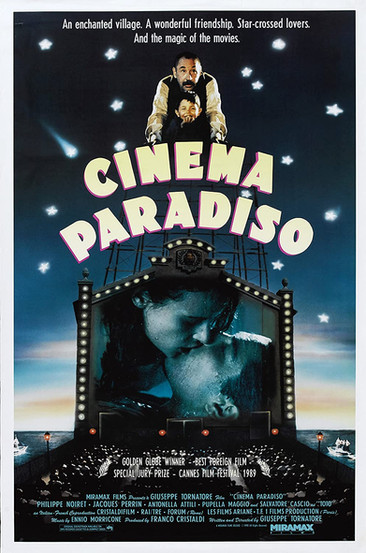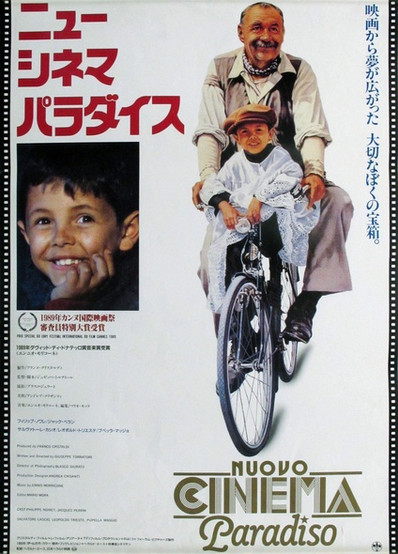"Cinema Paradiso", Dir: Giuseppe Tornatore, 1988
- Ravi Swami
- Jun 4, 2021
- 7 min read
"Cinema Paradiso" is, I have to admit, a film that I have studiously avoided in much the same way that I avoided films like "Jean De Florette" at the time of their release in the mid to late 1980's and for the same reasons. They appeared to me at the time to consolidate romantic notions of a foreign country aimed squarely at international audiences using lush photography and a myth of a rural idyll somewhere other than where you lived at the time.
I'm not exactly sure why I settled on it (Apple + TV) though there may have been an element of guilt that I had missed a film that is much quoted as a last word in films about the experience of watching films in the cinema and also possibly due to a recent diet of little known Italian films of the period in which the film is partly set.
The theme would certainly have resonated strongly with audiences in the 1980's when the future of the cinema-going faced an uncertain future in the wake of video tape and it taps into a certain nostalgia for the experience as it was for people of certain age and a feeling of longing for a time that seemed to be vanishing. I suspect that the experience of several later generations used to the generic cookie-cutter environments of multiplexes is very different.
I watched the film over two days, mainly because I found the first half almost unbearably sentimental and contrived. It came across as very self-consciously "Italian" - a "For Export Only" version of Italy - in a way that many of the recent viewings by earlier Italian film directors are not, even though the film uses similar picturesque rural locations to depict the village of "Giancaldo" and its' community, where much of the story takes place.
However, watching a film from the 50's and 60's is like a kind of time travel and the past appears like a different country, which is a large part of their appeal for me. Recreating the past in a film is a different matter and presents various challenges, most of which, to be fair, are handled well in the film, for example the contrast between the vast town square that the cinema faces, devoid of cars as it would have been in the 1950's when the first part of the film is set, compared to the "present day" of the 1980's of the concluding half, where it is shown to be quite the opposite, complete with loud advertising hoardings.
Tornatore's undoubted skill in composing a beautiful picture has the rather negative consequence of being irresistible to advertising agency creatives and the style has been endlessly ripped off in the same way that numerous ads set in rural France at the time inspired by "Jean De Florette" have done. Visually, the film is like the equivalent of a crème caramel (or perhaps a "Cannoli" would be more appropriate), crunchy and golden hued on top hiding an eggy mush underneath.
Tornatore delights in using complex camera moves at the start and later abandons them for a more conventional approach, allowing the narrative breathing space in the process.
At roughly the halfway mark - which is where I took a pause for a day or two - of what is quite a long film - between 144 and 125 minutes depending upon region - it's clear that it was intended to incorporate an interval - another aspect of the nostalgia for the bygone cinema experience - since the first half details how "Salvatore Di Vita", nicknamed "Toto", a young boy entranced by films shown at the towns' only cinema, the "Paradiso" of the title, befriends the projectionist "Alfredo" (French actor Philippe Noiret) which leads to a life-long friendship and his subsequent career as a successful film director, shown in preface with Jacques Perrin (Les Demoiselles De Rochefort) playing his adult self.
Part 1 is established as a flashback when Toto (Perrin) hears of the death of Alfredo, having left the village to pursue his film career and having never returned up to that point for reasons that are made clear in Part 2.
Throughout, the visuals are supported by Ennio Morricone's (co-written with his son Andrea) soaring leitmotiv score that is pitched to evoke just the right level of the nostalgic yearning felt by Toto as he reflects both on his early life exploring cinema with Alfredo and a lost love, and annoyingly so since it becomes a bit of an ear worm :)
The first part of the film concludes with a devastating accident resulting from unstable nitrate stock that causes a fire to break out in the projection booth, gutting the cinema and almost killing Alfredo, who is saved at the last minute by Toto - about 11 years of age at this point. Alfredo never fully recovers from his injuries and is blinded and since he has schooled Toto in the mysteries of film projection, when the cinema is refurbished, it is to Toto to whom he entrusts the role of projectionist.
Tornatore uses a clever transition device to fast-forward from the 11 year old Toto to Toto in his late teens with a close-up shot where Alfredo, now blind, feels his face with his hand and as he draws it down it acts as a transition in a single shot, a sequence that while successful, feels self-consciously "cinematic".
In the second half Toto has acquired a cine camera and is experimenting with making films himself and it is at this point that he sees "Elena" (Agnese Nano) a beautiful young woman of his age and with whom he instantly falls in love after filming her from a distance.
However, as Alfredo ruefully reflects, real life is not like the movies and such romantic inclinations often lead nowhere as life intervenes. Toto pursues Elena regardless and this leads to a brief romance that is interrupted when she has to move away to another city with her family and when Toto is called up for national service
When Toto returns to Giancaldo after completing his service, having also completely lost touch with Elena and with no hope of ever finding her again, he resumes his position as a projectionist at the new - refurbished following the fire that injured Alfredo - Cinema Paradiso, screening a variety of films ranging from romances to comedies such as those starring Alberto Sordi. Tornatore uses this second half to detail audience reactions to films such as And God Created Woman starring Brigitte Bardot with its' scenes of nudity, in the context of the rather conservative rural Italian community and also a look at how films were distributed amongst rural communities, with reels being split between villages and couriered back and forth.
Alfredo convinces Toto that he must escape Giancaldo for the big city to pursue his dream of making films before it is too late and extracts a promise from him that he will never return as well as putting aside any hankering after a lost love that may prevent him from doing so.
The second half concludes with Toto making the journey back to Giancaldo for Alfredo's funeral where he witnesses the now derelict cinema, which is later pulled down to make way for a car park to accommodate the vehicles that now fill the town square. Alfredo's widow gives Toto a rusty film can that Alfredo has left expressly for him and when he returns to Rome he arranges a private screening.
The reel contains numerous scenes clipped due to censorship from different films of couples kissing and as the footage plays out Toto's emotions well up - as does the score - as he realises that this is a kind of last farewell love letter to both cinema and to him from Alfredo and that even if such romantic moments may evaporate in the cold light of day, they can exist for eternity in films.
The second part of the film I found to be slightly more satisfying than the first, where Tornatore aims to imply the universality of the cinema experience regardless of location and cultural differences by filming vignettes of audience reactions that come across as a cliched patchwork - running the gamut from crying to laughing to masturbation - with references to "Commedia All'Italiana" in the performances, all in the same space at the same time, resulting in a collage of the collected the experiences of several people, rather than relying solely on his own subjective experience.
It perhaps comes as no surprise that the film has an autobiographical angle since Tornatore came from Giancaldo, which is not, as might be imagined, an invented place, suggesting a reflection of his own successful career in cinema.
There were moments in the film where I felt that what was being projected, mostly scratchy black and white films, seemed more real and truthful than whatever was going on the cinema itself, due in large part to the rather exaggerated performances that Tornatore extracts from his cast.
The success of "Cinema Paradiso" means that any film that tries to plumb the same territory is doomed to be compared unfavourably with it, simply because the plot covers all the bases, wrapped up in a chocolate box view of rural Italy like a perfectly crafted confection designed to sooth away any fears that cinema might be going through a demise, something that seems especially prescient in the current circumstances.
Certainly, I've developed ideas along similar lines that detail the end of the suburban cinemas where I grew up and the impact that they had on the Indian immigrant community in the U.K, thirsting for films from the Indian subcontinent and beyond, a place, like France or Italy, that is mad about films. Again, the challenge would always be to recreate the past since many of these cinemas are long gone and the temptation is to layer it with nostalgia, which for me, is the main fault of "Cinema Paradiso", though I'm sure many would disagree.
To a large extent I think its' appeal is that audiences filter their own cinema-going experiences through it and the specific details are irrelevant.
Finally, the part that resonated the most for me was Alfredo's reflection on staying behind or leaving to find your fortune somewhere else, added to which I can only concur that for some of us the collective cinema experience is something that was quite unique at a particular time and can possibly never be recreated in quite the same way as it is depicted in the film.
*As a postscript, the 173 minute 2002 "Directors Cut" includes reinstated scenes where Salvatore / Toto is briefly reunited with Elena after he sees a young woman who looks like her on a scooter after Alfredo's funeral and who turns out to be Elena's teenaged daughter.









Comments